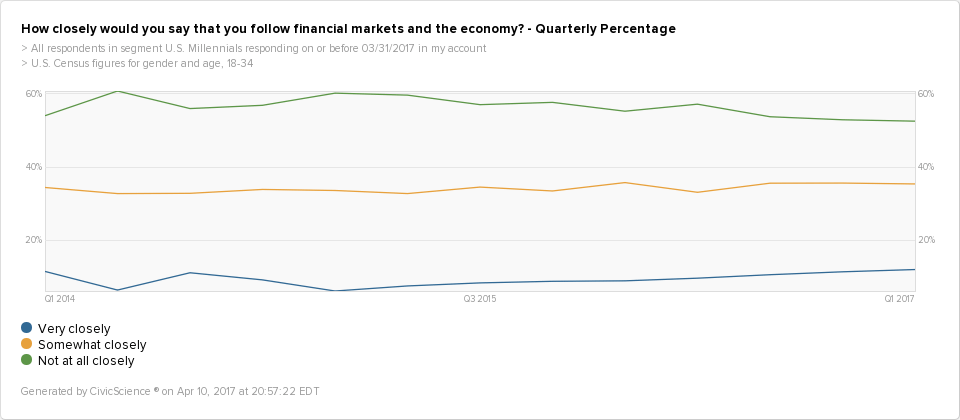The Gist: Every quarter over the past two years, we’ve seen growth among Millennials who say they follow financial markets and the economy “Very closely.” In fact, the percentage of Millennials who say they follow financial markets and the economy “Very closely” has doubled – from 6% to 12% – since Q1 2015.
Millennials Expect to Get High-Paying Jobs Directly Out of College.
Millennials are Materialistic.
Millennials are Bad at Saving Money.
Millennials Don’t Have Good Credit.
Millennial stereotypes courtesy of MoneyUnder30.
Though some stereotypes might have a hint of truth – others may be a bit hyperbolic. Millennials are often thought to not pay enough attention to the economy, but our data show that is (slowly) changing.
Take a look at this graph, segmented to only include Millennials:
As you can see, the percentage of Millennials who follow financial markets and the economy “Very closely” has doubled – from 6% to 12% – since Q1 2015.
Though 12% may not seem like a very high percentage, the growth is what speaks to us the most. In addition, that percentage is not much lower than Gen Xers who closely follow the economy (14%) or even Baby Boomers (18%).
Perhaps Millennials are finally starting to realize the large economic systems they are a part of, and choosing to be smarter with their money. Another cause of this newfound attention to the economy may be that many Millennials are starting to work full-time, so naturally are more keen to macroeconomic factors that could affect their hard-earned dollars.
Either way, their growing attention to the economy may make them less of a target for institutions that have relied on their lack-of-economic-attention in the past.
Interested in other insights? Check out our recent posts on sentiment surrounding EMV chips, the troubling issue of student debt, and the Plight of Financial Literacy in America.









